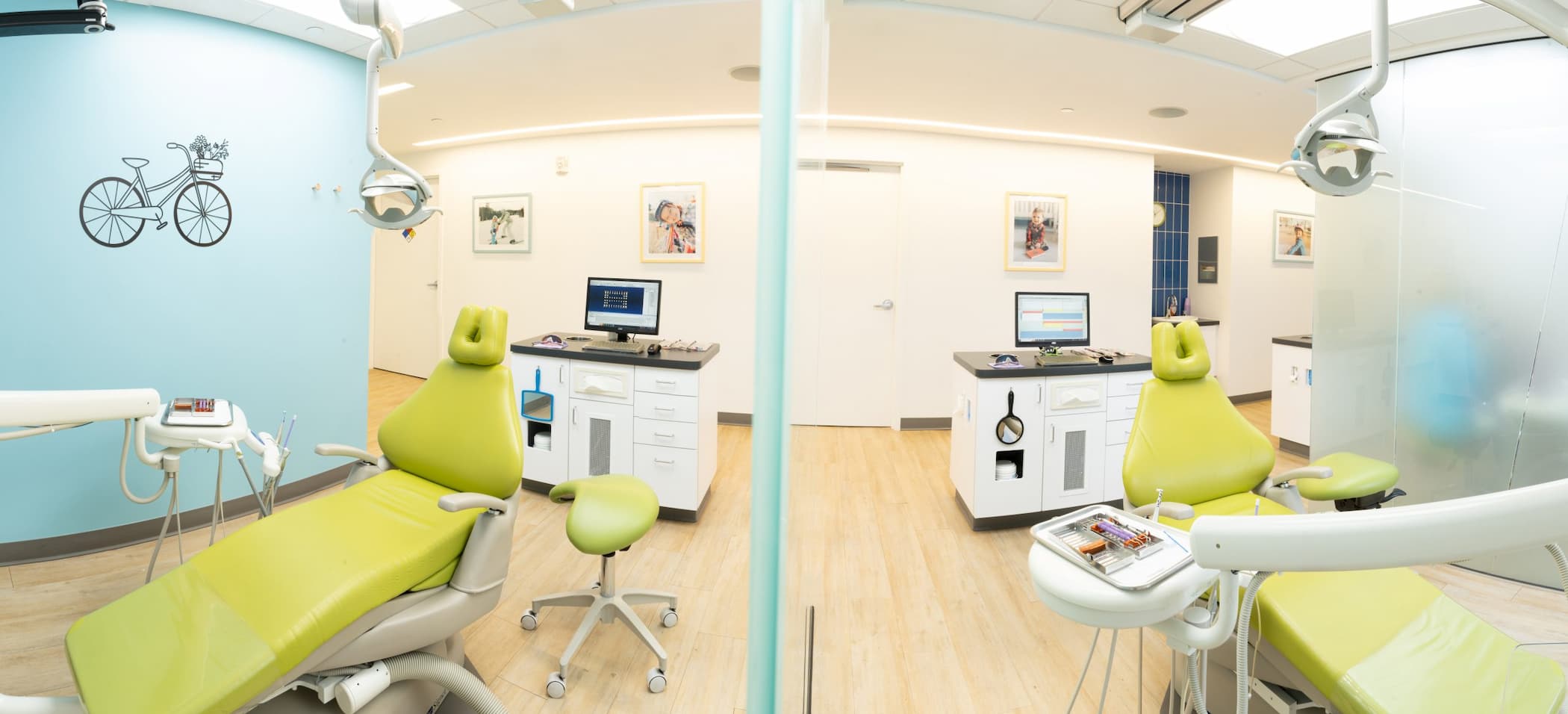Here at Rise and Shine Pediatric Dentistry, we know how many questions arise when thinking about taking your child to the dentist. Below are a list of frequently asked questions (FAQs) to help prepare both you and your child for your visit and address your concerns:

When should I schedule my child’s first dental visit?
We recommend you make an appointment to see a pediatric dentist as soon as your child gets his or her first tooth. The American Academy of Pediatric Dentistry and American Academy of Pediatrics recommend that children be seen within six months of getting their first tooth or by the age of one, whichever comes first.
How is a pediatric dentist different from my family/general dentist?
After obtaining a doctorate in dental surgery, pediatric dentists have completed additional years of specialized training in the field of pediatric dentistry. They have gained extensive knowledge about growth and development, and are experienced in treating infants, children, and adolescents. Pediatric dentists enjoy working with children and have additional knowledge related to physical and emotional development and behavior. Additionally, because our office is geared towards younger patients, you’ll find that our team is experienced at explaining dentistry in a way that helps children and their parents comfortable. Our goal is for positive early dental experiences to lead to a lifetime of healthy smiles and easy dental visits.
What happens during my child’s first dental visit?
Our goal is to introduce the dentist and our office to you and your child. We will discuss strategies for keeping smiles healthy at home- including daily brushing habits for prevention of cavities and healthy dietary choices to keep teeth and bodies healthy. We will gently explain the steps involved in cleaning your child’s teeth and do so at whatever level their comfort allows. At their first visit, we will evaluate their teeth, mouth, and jaws to make sure that everything is developing in a healthy way. We perform an efficient exam at the same time as we clean your child’s teeth, in an effort to keep early visits positive for everyone!
How often should my child visit the dentist?
We recommend scheduling checkups every six months. Depending on your child’s risk for cavities and any history of trauma to his or her teeth, we may recommend more frequent visits. We will work with you to devise a plan so your child will have the best oral health possible.
Baby teeth aren’t permanent. Why are they so important?
Your child’s first teeth play an important role in his or her development. While they’re in place, these primary teeth help your little one speak, smile, and chew properly. They also hold space in the jaw for permanent teeth. If a child loses a tooth too early, the nearby teeth may encroach on that space, which can result in crooked or misplaced permanent teeth. Healthy teeth contribute to an overall healthy body, and healthy baby teeth are the first step in a healthy adult smile!
When should I start using toothpaste to clean my child’s teeth?
As your child’s first few teeth erupt, it is appropriate to brush with only water on your toothbrush. For most children, it is ideal to introduce a fluoride toothpaste around age two. Only a tiny “grain of rice” amount is needed. You may teach your child to practice spitting extra toothpaste after brushing. If your child has a higher risk for cavities or sensitivity on any teeth, or dentist may discuss introducing fluoride toothpaste earlier than age two. Children benefit from parental assistance with brushing for several years as they learn to effectively take care of their smile independently.
What causes cavities?
Cavities are caused by a combination of factors. Daily hygiene routines, food and drink choices, sharing of bacteria with family members or classmates who have a higher risk for cavities, and certain genetic components related to how teeth are formed or how much saliva a person has in their mouth all contribute to a person’s risk for cavities. In order to prevent cavities, be sure your child brushes his or her teeth at least twice a day with fluoride toothpaste and flosses with your help every evening. Flossing daily is important because flossing can reach areas between the teeth that brushing cannot. You can also keep your child’s smile healthy by avoiding giving your child sugary foods and drinks, especially between meals. Cavities grow when foods or drinks with carbohydrates sit on the teeth for an extended time, so try to offer a balanced diet at home in order to prevent cavities.
Does my child need dental sealants?
Sealants cover the pits and fissures that are difficult to thoroughly brush and therefore make teeth susceptible to decay. We recommend sealants, especially for the hard to reach molars, to protect your child’s teeth and help them avoid cavities. Sealants are supported by dental literature as a safe, effective preventive measure for protecting your child’s teeth and are the best standard or care.
My child plays sports. How can I protect his or her teeth?
Even children’s sports involve contact, and so we recommend a mouthguard for children who participate in them. For children transitioning between baby teeth and adult teeth, a “boil-and-bite” mouthguard can be a good option as smiles change often. If your little one plays baseball, soccer, or other sports, ask us about getting a custom-fit guard made to protect his or her teeth, lips, cheeks and gums once permanent teeth are present.
What should I do if my child sucks his or her thumb or pacifier?
Thumb sucking or pacifier use are very normal calming mechanisms for infants and very young children to learn to self-soothe. Depending on how many years your child continues the habit and how often throughout the day they have a sucking habit, the position of your child’s teeth may change or the growth pattern of the jaws may be affected. Our goal is for your child to learn other self-soothing, coping strategies as they grow, so that the frequency of the habit decreases. The sooner your child transitions away from the habit entirely, the more likely it is that the position of their teeth and growth of their jaws will self correct rather than require intervention. We are here to offer helpful strategies and support you and your child as they become ready to transition out of this habit.
Why should my child have dental x-rays taken?
We follow guidelines of the American Academy of Pediatric Dentistry for the timing and frequency of dental radiographs. Depending on your child’s stage in dental development, position of teeth, risk for cavities, and history of dental trauma, we will recommend the appropriate time to take x-rays as part of a comprehensive dental exam. Radiographs are helpful to evaluate the health of the teeth in areas where a clinical exam cannot and to evaluate the development of the permanent teeth.
If you have any other questions, don’t hesitate to contact us today at (303) 758-0223 today.
